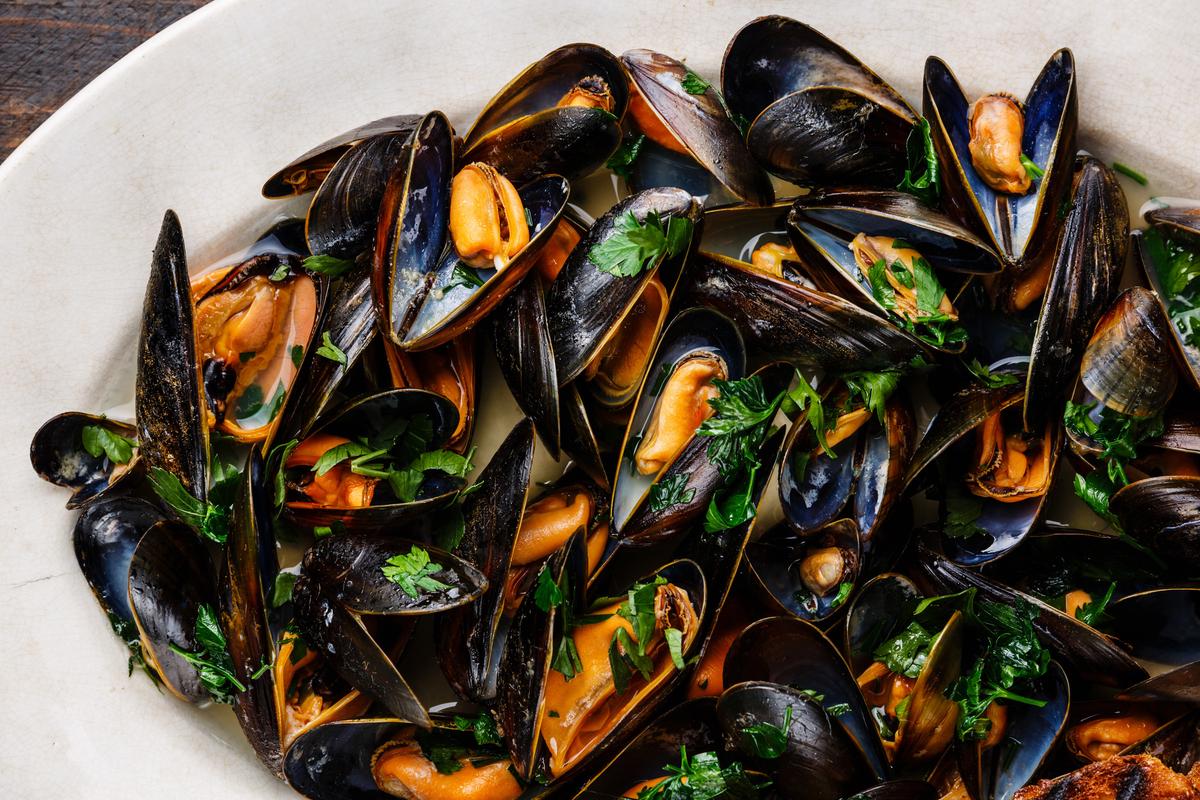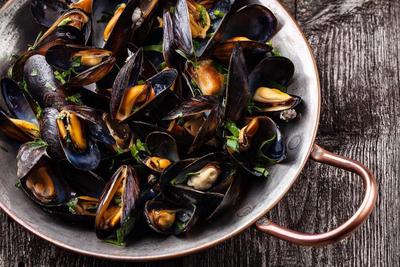🐚 Can Dogs Eat Mussles? The facts
Are the shellfish good or bad for dogs, are dogs allergic to Mussles? Lets dive into it
 Mussles being cooked in a pan
Mussles being cooked in a pan
Dog Eat Guide Summary
Mussel shells are very nutritious and contain many essential nutrients that your dog needs. They also have high levels of calcium which helps in building strong bones and teeth. So if you want to give your pet some healthy treats then these mussels will be perfect!
But before we get into it let’s first understand why do they call this as “mussel shell”. The word comes from the Latin word, ‘Mussa’ meaning a small ball or sphere. This is because when the shell opens its shell, it looks like a little ball. The most common types include:
Blue-green mussel 🔵 - It has an amazing flavor and can easily be digested by our pets. If you don’t know how to cook them properly then just boil them until soft. Then mash them up and feed them to your dog.
Green-lipped mussel 🟢 – Also known as Pacific mussel. Very similar to blue-green except green color. Boiling makes their meat tough and chewy. Steaming on the other hand gives them a tender texture.
Black mussel ⚫ – A bit different than others. Instead of being cooked, black is served raw. Raw means uncooked. When fed to your dog, make sure to remove any sand particles inside. Otherwise it could cause choking.
White mussel ⚪ – Similar to black, only white in color. Like all other types, it too must be removed of any sand particles.
Powder form
If you don’t mind freezing some of your own mussels before serving them to your dog, this option works well too. Simply freeze the shells after removing the meaty portion and add them to your dog’s dry kibble.
You’ll need to make sure that the powder doesn’t clump together though. It should look similar to ground beef. The powder forms come from raw mussels, so bear in mind that it hasn’t been cooked first.
Dried
This method isn’t recommended by most veterinarians due to concerns over salmonella contamination. We would recommend boiling to kill anything dangerous in this case

Are mussels healthy 🙋♀️
When it comes to nutrition value, these beat out all types of seafood including shrimp, salmon, tuna, cod, halibut, scallops, crab, lobster, clams, oysters, etc. They provide more protein per serving compared to those mentioned above. Let’s go through so of the many positive benefits of mussels:
✅ Minerals and vitamins
Mussel shells contain minerals like calcium, magnesium, iron, zinc, copper, manganese, phosphorus, sodium, potassium, iodine, selenium, molybdenum, boron, silicon, fluorine, chlorine, sulfur, nitrogen, and many others.
✅ Low Calories
They contain low calories, offering around 100 calories per half-cup serving size. This means it can be used as an alternative to dry food. It has less fat than beef jerky too!
✅ High Protein Content
A single ounce of mussels contains over 20 grams of protein. The same amount of lean ground turkey provides 12 grams of protein, in short they’re a great source of protein.
✅ Rich In Omega 3 Fatty Acids
Omega 3 fatty acids help improve heart health, brain function, skin condition, joint pain relief, eye sight improvement, immune system support, and much more. These are an excellent source, providing about 1 gram of fish oil fats per half cup serving. Salmon offers 0.6 grams while chicken breast only provides 0.25 grams.
✅ Good Source Of Vitamin B12
Vitamin B12 is important for the proper functioning of nerves, muscles, blood cells, and DNA synthesis. Mussels are rich sources of vitamin B12. One ounce of these contains almost 10 micrograms of vitamin B12. Chicken liver only supplies 7 micrograms.
✅ Contains Potassium & Calcium
Mussels are a rich source of both potassium and calcium. An ounce of these contains approximately 200 milligrams of potassium and 300 mg of calcium. Beef steak only provides 50mg of potassium and 150 mg of calcium. Fairly inexpensive depending on where you live
You won’t need to spend a fortune buying mussels every time you want to treat your dog 🐶. All you need to buy is two pounds at most. Compare that to $10-$20 dollars spent on dried foods. 8. Can Be Used As Alternative Dry Food If you already use a dry kibble diet for your dog, then mussels would work great as an alternative.
✅ No Unhealthy Additives
They don’t contain any unhealthy additives like gluten, corn, soy, wheat, dairy, eggs, sugar, salt, preservatives, fillers, colors, flavors, dyes, hormones, antibiotics, pesticides, growth promoters, and GMOs.
✅ Easy Digestion
Another reason why these are so good for dogs is that they can easily digest. Their shells protect their soft flesh. Which makes them easy to chew on. Plus, they’re not too big. So there’s no risk of choking or gagging.

Can puppies have them
Yes! Puppy and kitten owners should also consider feeding mussels to their pets. Since puppies and kittens have smaller stomachs, the small-sized shellfish will fit better into their digestive systems. Also, since these animals tend to get diarrhoea often, this type of diet may prevent such problems from occurring.
Can use with other food
Since they do not spoil quickly, you can safely feed them with other foods. You can even mix them up with regular meals if you wish. Just remember to separate them 30 minutes before eating.
Even more healthy benefits
The list of benefits is exhaustive which is great to hear, there are plenty of health benefits associated with these shellfish. Here some worthy mentions not discussed above:
- Helps maintain strong bones and teeth
- Improves digestion
- Promotes overall wellness
- Lowers cholesterol levels
- Reduces inflammation 🔥
Can dogs be allergic to shellfish?
It’s common to see green-lipped’s listed in the ingredients of some high-quality dog foods treats. Shellfish allergies aren’t common among dogs, but there are cases where an allergy has been identified. If your dog develops symptoms such as vomiting, diarrhea, hives, itching, wheezing, coughing, sneezing, swelling around his/her eyes after eating shellfish then he may have a shellfish allergy and a allergic reaction.
It’s best not to feed him/her shellfish until you know what caused the reaction. They’re also not known for having high levels of mercury compared to other fish products such as canned Tuna, however it is something to be mindful of if also feeding other canned fish or raw seafood/fish since this may accumulate to a dangerous level.
Our final thoughts
Yes, they can eat these. They’re delicious! Just keep in mind that they small pretty bad when cooked. So, cook them slowly over low heat until they turn bright green. Then serve with some dry food. That’s our recommendation for you.